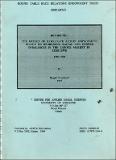| dc.contributor.author | Strachan, Brigid | |
| dc.coverage.spatial | Zimbabwe | en_GB |
| dc.date.accessioned | 2014-12-03T14:48:07Z | |
| dc.date.available | 2014-12-03T14:48:07Z | |
| dc.date.issued | 1993 | |
| dc.identifier.citation | Strachan, Brigid (1993) Report On :The Impact Of Redressive Action Employment Policy On Redressing Racial And Gender Imbalances In The Labour Market In Zimbabwe 1980/1989, CASS Report 1993. Harare, Mt. Pleasant: CASS | en_GB |
| dc.identifier.uri | https://opendocs.ids.ac.uk/opendocs/handle/20.500.12413/5357 | |
| dc.description | A CASS Report on racial and gender imbalances in the labour market in Zimbabwe in the period 1980-1989. | en_GB |
| dc.description.abstract | This report will examine redressive action employment policy, and its impact on the racial and gender imbalances in employment in the public and private sectors since 1980. Historically blacks were excluded from settler-colonial society, especially from decision making in politics. Few blacks moved up the occupational scale in the public or the private sector. The education and training system served as an instrument of settler-colonial society. Whites were given priority in access to secondary, university and technical education, and whites dominated middle and high level occupational categories in the public and private sectors. At a skilled level whites controlled the trade unions. They ensured that their members did not receive competition from black labour, keeping black workers in unskilled and semi-skilled jobs.
Redressive action in Zimbabwe, whilst not fundamentally different from other African countries, has some particular features. Zimbabwe has a much larger local or resident white population than most other African states. The country had significantly more black graduates than most other African states at the time of their independence. The Zimbabwe economy is relatively developed with a highly diversified industrial, commercial and agricultural base. A significant amount of this economic activity has been dependent upon local white entrepreneurial skills and capital. The country also experienced a far more protracted and bitter war than most other African states in order to put an end to white minority rule. | en_GB |
| dc.description.sponsorship | The Round Table Race Relations Endowment Trust. | en_GB |
| dc.language.iso | en | en_GB |
| dc.publisher | Centre for Applied Social Sciences (CASS), University of Zimbabwe (UZ) | en_GB |
| dc.relation.ispartofseries | CASS Report;1993 Report. | |
| dc.rights.uri | http://creativecommons.org/licenses/by-nc-nd/3.0/ | en_GB |
| dc.subject | Development Policy | en_GB |
| dc.subject | Gender | en_GB |
| dc.subject | Work and Labour | en_GB |
| dc.title | Report On :The Impact Of Redressive Action Employment Policy On Redressing Racial And Gender Imbalances In The Labour Market In Zimbabwe 1980/1989 | en_GB |
| dc.type | Series paper (non-IDS) | en_GB |
| dc.rights.holder | University of Zimbabwe | en_GB |


